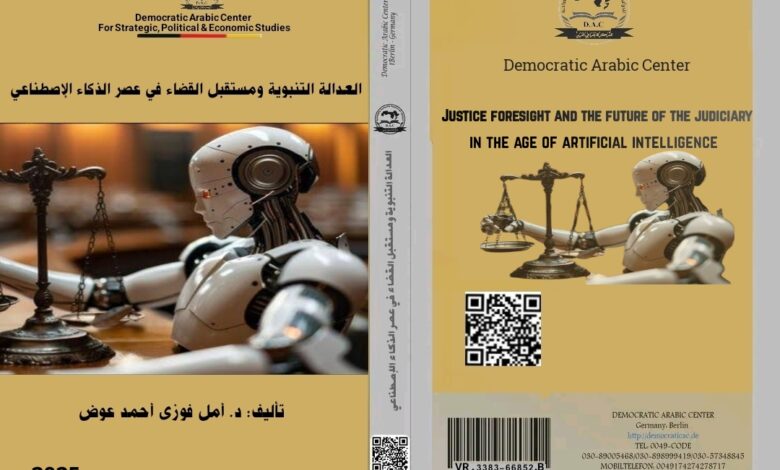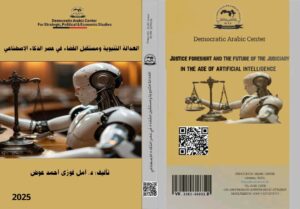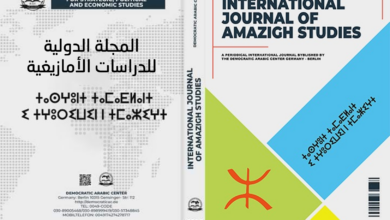الكتب العلمية
العدالة التنبؤية ومستقبل القضاء في عصر الذكاء
Justice foresight and the future of the judiciary in the age of artificial intelligence

تأليف : د. امل فوزي احمد عوض – دكتوراه في القانون / كلية الحقوق / جامعة عين شمس – رئيس وحدة تكنولوجيا المعلومات – كلية التربية الفنية – جامعة حلوان
نسخة “pdf”-
العدالة التبؤية ومستقبل القضاء فى عصر الذكاء الإصطناعى
الطبعة الأولى “2025″ –من كتاب : – العدالة التبؤية ومستقبل القضاء فى عصر الذكاء الإصطناعى
جميع حقوق الطبع محفوظة #المركز_الديمقراطي_العربي ولا يسمح بإعادة إصدار هذا الكتاب أو اي جزء منه أو تخزينه في نطاق إستعادة المعلومات أو نقله بأي شكل من الأشكال، دون إذن مسبق خطي من الناشر .
تقديم : –
يلعب النظام القضائي دورًا أساسيًا في حماية حقوق الأفراد وضمان العدالة في المجتمع. ومع ذلك، فإن النظام القضائي يواجه العديد من التحديات، والتى تتمثل فى حجم ونوعية البيانات والمعلومات القانونية المتزايدة، تعقيد القضايا القانونية،نقص الموارد البشرية .
في العقدين الماضيين، شهدت تقنيات الذكاء الإصطناعي تطورًا هائلًا، مما أدى إلى ظهور العديد من التطبيقات في مختلف المجالات، بما في ذلك المجال القانوني ويعد التحليل التنبؤي للقرارات القضائية باستخدام تقنيات التعلم الآلي أحد هذه التطبيقات الواعدة حيث يمكن أن تساعد هذه التقنية في تحسين كفاءة وفعالية النظام القانوني، كما يمكن أن تساعد في اتخاذ قرارات أكثر عدلًا وفعالية باستخدام تقنيات التعلم الآلي لتحليل البيانات والمعلومات القانونية، وذلك بهدف : تحسين دقة وكفاءة اتخاذ القرار القضائي؛تعزيز الشمولية والعدالة في اتخاذ القرار القضائي؛زيادة شفافية وتفسيرية النظام القضائي.
مشكلة البحث : على الرغم من الإمكانات الواعدة للتحليل التنبؤي للقرارات القضائية باستخدام تقنيات التعلم الآلي، إلا أنه يواجه أيضًا بعض التحديات، بما في ذلك:التحديات الفنية: مثل ضمان أمن وسلامة البيانات، وكفاءة الأنظمة المستخدمة.؛التحديات القانونية: مثل الحاجة إلى تعديل بعض النصوص القانونية والأنظمة لتلائم استخدام تقنيات الذكاء الإصطناعى.؛
التحديات الثقافية: مثل تقبل استخدام تقنيات الذكاء الإصطناعى من قبل القضاة ومعاونيهم والمتقاضيين ومعاونيهم منهج البحث :سوف نستخدم في هذه الورقة البحثية المنهج التحليلي والتأصيلي لعرض مسائلها والحلول الملائمة لإشكالياتها أهم النتائج: يمكن استخدام التحليل التنبؤي للقرارات القضائية في تحسين كفاءة وفعالية النظام القانوني، كما يمكن أن تساعد في اتخاذ قرارات أكثر عدلًا وفعالية باستخدام تقنيات التعلم الآلي لتحليل البيانات والمعلومات القانونية.
أهم التوصيات :ضرورة استغلال كل الإمكانيات التي تسمح بها تطبيقات الذكاء الإصطناعى لتحقيق غايات إنجاز إجراءات التقاضي وتحقيق العدالة بفاعلية.
Preparation : Dr. Amal Fawzi Ahmad Awad – PHD in Law/Faculty of Law/Ain Shams UniversityHead of Information Technology Unit – Faculty of Technical Education – Helwan University
Abstract
The judicial system plays a fundamental role in protecting individuals’ rights and ensuring justice in society. However, the judicial system faces many challenges, including the increasing volume and quality of legal data and information, the complexity of legal cases, and the lack of human resources. In the past two decades, artificial intelligence technologies have seen tremendous development, leading to the emergence of many applications in various fields, including the legal field. Predictive analysis of judicial decisions using machine learning techniques is one of these promising applications. This technology can help improve the efficiency and effectiveness of the legal system, and it can also assist in making more fair and effective decisions by using machine learning techniques to analyze legal data and information, with the aim of:
• Improving the accuracy and efficiency of judicial decision-making • Enhancing inclusivity and justice in judicial decision-making • Increasing transparency and interpretability of the judicial system Research Problem: Despite the promising potentials of predictive analysis of judicial decisions using machine learning techniques, it also faces some challenges, including: • Technical challenges: such as ensuring data security and safety, and the efficiency of the systems used. • Legal challenges: such as the need to amend some legal texts and systems to accommodate the use of artificial intelligence technologies. • Cultural challenges: such as the acceptance of using artificial intelligence technologies by judges, their assistants, litigants, and their assistants.
Research Methodology: We will use the analytical and foundational approach in this research paper to present its issues and the appropriate solutions to its problems.
Main Findings: Predictive analysis of judicial decisions can be used to improve the efficiency and effectiveness of the legal system, and it can also assist in making more fair and effective decisions by using machine learning techniques to analyze legal data and information.
Main Recommendations: It is necessary to exploit all the potentials allowed by artificial intelligence applications to achieve the goals of accomplishing litigation procedures and achieving justice effectively.
الناشر: المركـز الديمقراطي العربي للدراسات الاستراتيجية والسياسية والاقتصادية – ألمانيا – برلين
Democratic Arabic Center- Berlin – Germany



